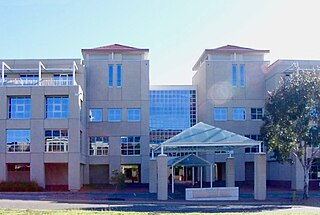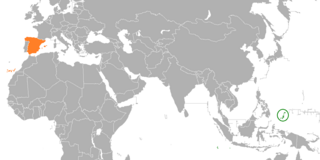
The foreign relations of Afghanistan are in a transitional phase since the 2021 fall of Kabul to the Taliban and the collapse of the internationally-recognized Islamic Republic of Afghanistan. No country has recognised the new regime, the Islamic Emirate of Afghanistan. Although some countries have engaged in informal diplomatic contact with the Islamic Emirate, formal relations remain limited to representatives of the Islamic Republic.

Palau, officially the Republic of Palau, is an island country in the Micronesia subregion of Oceania in the western Pacific. The republic consists of approximately 340 islands and connects the western chain of the Caroline Islands with parts of the Federated States of Micronesia. It has a total area of 466 square kilometers (180 sq mi), making it one of the smallest countries in the world. The most populous island is Koror, home to the country's most populous city of the same name. The capital Ngerulmud is located on the largest island of Babeldaob, in Melekeok State. Palau shares maritime boundaries with international waters to the north, the Federated States of Micronesia to the east, Indonesia to the south, and the Philippines to the northwest.

Foreign relations of Australia are influenced by its position as a leading trading nation and as a significant donor of humanitarian aid. Australia's foreign policy is guided by a commitment to multilateralism and regionalism, as well as to build strong bilateral relations with its allies. Key concerns include free trade, terrorism, refugees, economic co-operation with Asia and stability in the Indo-Pacific. Australia is active in the United Nations and the Commonwealth of Nations. Given its history of starting and supporting important regional and global initiatives, it has been described as a regional middle power par excellence.

Foreign relations of Israel refers to diplomatic and trade relations between Israel and other countries around the world. Israel has diplomatic ties with 164 of the other 192 UN member states as of December 2020. Israel is a member of the United Nations (UN) and a number of other international organisations. Israel maintains full diplomatic relations with two of its Arab neighbours, Egypt and Jordan, after signing peace treaties in 1979 and 1994 respectively. In 2020, Israel signed agreements establishing diplomatic relations with four Arab League countries, Bahrain, the United Arab Emirates, Sudan and Morocco. As of 2021, Israel had formal diplomatic relations with 168 other countries, while twenty-eight UN member states have either never established, or have broken off diplomatic relations with Israel.

Palau gained its independence October 1, 1994, with the entry into force of the Compact of Free Association with the United States. Palau was the last Trust Territory of the Pacific Islands territories to gain its independence. Under the Compact, the U.S. remains responsible for Palau's defense for 50 years.

Relations between Afghanistan and the United States began in 1921 under the leaderships of King Amanullah Khan and President Warren G. Harding, respectively. The first contact between the two nations occurred further back in the 1830s when the first recorded person from the United States explored Afghanistan. The United States government foreign aid program provided about $500 million in aid for economic development; the aid ended before the 1978 Saur Revolution. The Soviet invasion of Afghanistan in 1979 was a turning point in the Cold War, when the United States started to financially support the Afghan resistance. The country, under both the Carter and Reagan administrations committed $3 billion dollars in financial and diplomatic support to the anti-Soviet Mujahideen forces. Beginning in 1980, the United States began admitting thousands of Afghan refugees for resettlement, and provided money and weapons to the Mujahideen through Pakistan's Inter-Services Intelligence (ISI). The USSR withdrew its troops in 1989.

Palau–United States relations are bilateral relations between the sovereign nations of Palau and the United States. Palau has an embassy in Washington, DC, whilst the United States has an embassy in Koror. The current US Chargé d'Affaires to Palau is James Boughner

Solomon Islands – United States relations are bilateral relations between Solomon Islands and the United States. Initial relations were forged during World War II with what was then the British Solomon Islands Protectorate during the Japanese occupation, and this relationship remained strong as Solomon Islands gained its independence in 1978. Relations continued until 1993 when post-Cold War budget cuts closed the United States Embassy in Honiara. Beginning in 2022, in an attempt to counter growing Chinese influence in Solomon Islands, the United States has demonstrated increased commitment to the restoration of relations with the country. In February 2023, the United States re-opened its embassy in Honiara.

Somalia–United States relations are bilateral relations between the Federal Republic of Somalia and the United States of America. Somalia has an embassy in Washington, D.C., and the United States maintains an embassy in Mogadishu which was reopened in late 2019.

Ngerulmud is the seat of government of the Republic of Palau, an island nation in the Pacific Ocean. It replaced Koror City as a capital in 2006. The settlement is located in the state of Melekeok on Babeldaob, the country's largest island, located 20 kilometers northeast of Koror City and 2 km northwest of Melekeok City. It is the least-populous capital city of a sovereign nation in the world.

Palau–Philippines relations refers to the bilateral relations between Palau and the Philippines. The Philippines and Palau have shared centuries of history under the same Spanish colony, and after Philippine independence, Palaos (Palau) sent a delegation to the Malolos Congress.

Mexican-Peruvian relations are the historical and current bilateral relationship between the United Mexican States and the Republic of Peru. Both nations are members of the Asia-Pacific Economic Cooperation, Community of Latin American and Caribbean States, Lima Group, Organization of Ibero-American States, Organization of American States, Pacific Alliance and the United Nations.

Diplomatic relations are maintained between Japan and Palau, a small island country in the western Pacific Ocean that was once a Japanese colony. There is a Japanese embassy on the Palauan island of Koror and a Palauan embassy in Tokyo.

The political status of the Cook Islands and Niue is formally defined as being states in free association within the Realm of New Zealand, which is made up of the Cook Islands, Niue, and New Zealand and its territories, Tokelau and the Ross Dependency. The Cook Islands and Niue have full constitutional independence from New Zealand and act as independent countries. Some countries have recognised them as sovereign entities and established diplomatic relations. However, New Zealand may carry out defence and foreign affairs on behalf of the two associated states when requested.

Palau–Spain relations are the bilateral and diplomatic relations between these two countries. Palau currently has no diplomatic or consular representation in Spain. However, Spain has a consulate in Koror, while the embassy representing Spain for Palau is in Manila, Philippines.

Palau–Serbia relations are the bilateral relations between Palau and Serbia. Both nations are members of the United Nations. Two countries collaborate through their non-resident embassies in Tokyo.

Palau–Taiwan relations are the bilateral relations between Palau and Taiwan. Palau maintains an embassy in Taipei and the ROC maintains an embassy in Koror City. Exchanges between the two nations range from agriculture, culture, education, fishery, medical services, tourism and water supply infrastructure.
The Embassy of the United States in Muscat is the diplomatic mission of the United States of America in Oman.


















